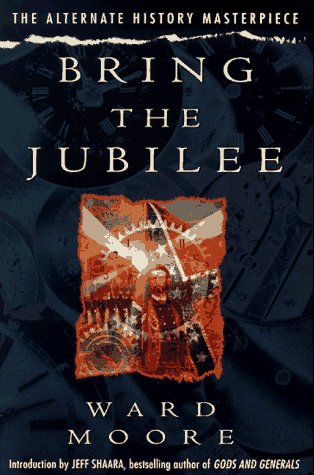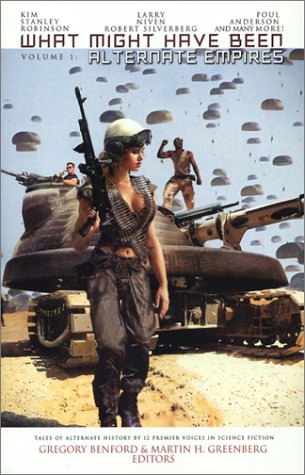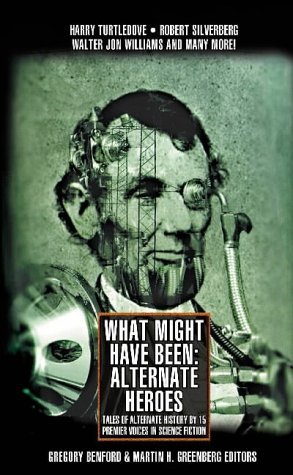Time Travel/Alternate Histories
Explore the best alternate history and time travel books that reimagine the past and future. Discover thrilling novels where history takes a different path and time bends to the will of daring adventurers.

Book
The Time Machine
by H. G. Wells
Wells's genre-defining novel of time travel When a Victorian scientist propels himself into the year a.d. 802,701, he is initially delighted to find that suffering has been replaced by beauty, contentment, and peace. Entranced at first by the Eloi, an elfin species descended from man, he soon realizes that these beautiful people are simply remnants of a once-great culture—now weak and childishly afraid of the dark. They have every reason to be afraid: in deep tunnels beneath their paradise lurks another race descended from humanity—the sinister Morlocks. And when the scientist’s time machine vanishes, it becomes clear he must search these tunnels if he is ever to return to his own era. This edition includes a newly established text, a full biographical essay on Wells, a list of further reading, and detailed notes. Marina Warner’s introduction considers Wells’s development of the “scientific romance” and places the novel in the context of its time. For more than seventy years, Penguin has been the leading publisher of classic literature in the English-speaking world. With more than 1,700 titles, Penguin Classics represents a global bookshelf of the best works throughout history and across genres and disciplines. Readers trust the series to provide authoritative texts enhanced by introductions and notes by distinguished scholars and contemporary authors, as well as up-to-date translations by award-winning translators.

Book
Lest Darkness Fall
by Lyon Sprague De Camp
In "Lest Darkness Fall," twentieth-century academic Martin Padway travels through time to prevent the fall of the Roman Empire, while in "To Bring the Light," Herosilla must forge the birth of Roman civilization.


Book
The Door Into Summer
by Robert Anson Heinlein
"Not only America's premier writer of speculative fiction, but the greatest writer of such fiction in the world. He remains today as a sort of trademark for all that is finest in American imaginative fiction." --Stephen King Electronics engineer Dan Davis has finally made the invention of a lifetime: a household robot with extraordinary abilities, destined to dramatically change the landscape of everyday routine. Then, with wild success just within reach, Dan's greedy partner and greedier fiancée trick him into taking the long sleep--suspended animation for thirty years. They never imagine that the future time in which Dan will awaken has mastered time travel, giving him a way to get back to them--and at them . . . Once again, the author of Stranger in a Strange Land and Starship Troopers displays his genius. The Door in to Summer proves why Robert Heinlein's books have sold more than 50 million copies, winning countless awards, and earning him the title of Grand Master of Science Fiction. "Heinlein . . . has the ability to see technologies just around the bend. That, combined with his outstanding skill as a writer and engineer-inventor, produces books that are often years ahead of their time." --Philadelphia Inquirer "One of the grandmasters of science fiction." --The Wall Street Journal

Book
The Big Time
by Fritz Leiber
Have you ever worried about your memory, because it doesn't seem to recall exactly the same past from one day to the next? If you have, then you've had hints of the Change War. It's been going on for a billion years and it'll last another billion or so. And in the midst of the war is the Place, outside space and time, where Greta Forzane and the other Entertainers provide solace and R&R for tired time warriors.

Book
The Man in the High Castle
by Philip K. Dick
It's America in 1962. Slavery is legal once again. the few Jews who still survive hide under assumed names. In San Francisco the I Ching is as common as the Yellow Pages. All because some 20 years earlier the United States lost a war--and is now occupied jointly by Nazi Germany and Japan. This harrowing, Hugo Award-winning novel is the work that established Philip K. Dick as an innovator in science fiction while breaking the barrier between science fiction and the serious novel of ideas. In it Dick offers a haunting vision of history as a nightmare from which it may just be possible to awake.


Book
Slaughterhouse-Five
by Kurt Vonnegut
Kurt Vonnegut’s masterpiece, Slaughterhouse-Five is “a desperate, painfully honest attempt to confront the monstrous crimes of the twentieth century” (Time). Selected by the Modern Library as one of the 100 best novels of all time • One of The Atlantic’s Great American Novels of the Past 100 Years Slaughterhouse-Five, an American classic, is one of the world’s great antiwar books. Centering on the infamous World War II firebombing of Dresden, the novel is the result of what Kurt Vonnegut described as a twenty-three-year struggle to write a book about what he had witnessed as an American prisoner of war. It combines historical fiction, science fiction, autobiography, and satire in an account of the life of Billy Pilgrim, a barber’s son turned draftee turned optometrist turned alien abductee. As Vonnegut had, Billy experiences the destruction of Dresden as a POW. Unlike Vonnegut, he experiences time travel, or coming “unstuck in time.” An instant bestseller, Slaughterhouse-Five made Kurt Vonnegut a cult hero in American literature, a reputation that only strengthened over time, despite his being banned and censored by some libraries and schools for content and language. But it was precisely those elements of Vonnegut’s writing—the political edginess, the genre-bending inventiveness, the frank violence, the transgressive wit—that have inspired generations of readers not just to look differently at the world around them but to find the confidence to say something about it. Authors as wide-ranging as Norman Mailer, John Irving, Michael Crichton, Tim O’Brien, Margaret Atwood, Elizabeth Strout, David Sedaris, Jennifer Egan, and J. K. Rowling have all found inspiration in Vonnegut’s words. Jonathan Safran Foer has described Vonnegut as “the kind of writer who made people—young people especially—want to write.” George Saunders has declared Vonnegut to be “the great, urgent, passionate American writer of our century, who offers us . . . a model of the kind of compassionate thinking that might yet save us from ourselves.” More than fifty years after its initial publication at the height of the Vietnam War, Vonnegut’s portrayal of political disillusionment, PTSD, and postwar anxiety feels as relevant, darkly humorous, and profoundly affecting as ever, an enduring beacon through our own era’s uncertainties.


Book
The Guns of the South
by Harry Turtledove
Winter of 1864, General Robert E. Lee finds himself and his Army of Northern Virginia huddled on the banks of the Rapidan, trying to fight a war despite meager rations and a terrible lack of equipment - indeed, some of his men do not even have shoes. But when Lee finds a way to arm his forces, the tide suddenly turns; the rebels win a decisive victory at the Battle of Wilderness. Lee presses his advantage, marching on Washington. But if Lincoln surrenders, and the.

Book
Doomsday Book
by Connie Willis
Connie Willis draws upon her understanding of the universalities of human nature to explore the ageless issues of evil, suffering, and the indomitable will of the human spirit. “A tour de force.”—The New York Times Book Review For Kivrin, preparing to travel back in time to study one of the deadliest eras in humanity’s history was as simple as receiving inoculations against the diseases of the fourteenth century and inventing an alibi for a woman traveling alone. For her instructors in the twenty-first century, it meant painstaking calculations and careful monitoring of the rendezvous location where Kivrin would be received. But a crisis strangely linking past and future strands Kivrin in a bygone age as her fellows try desperately to rescue her. In a time of superstition and fear, Kivrin—barely of age herself—finds she has become an unlikely angel of hope during one of history’s darkest hours.

Book
To Say Nothing of the Dog
by Connie Willis
“Willis effortlessly juggles comedy of manners, chaos theory and a wide range of literary allusions [with a] near flawlessness of plot, character and prose.”—Publishers Weekly (starred review) From Connie Willis, winner of multiple Hugo and Nebula Awards, comes a comedic romp through an unpredictable world of mystery, love, and time travel. Ned Henry is badly in need of a rest. He’s been shuttling between the twenty-first century and the 1940s in search of a hideous Victorian vase called “the bishop’s bird stump” as part of a project to restore the famed Coventry Cathedral, destroyed in a Nazi air raid. But then Verity Kindle, a fellow time traveler, inadvertently brings back something from the past. Now Ned must jump to the Victorian era to help Verity put things right—not only to save the project but also to prevent altering history itself.



Book
The Time Traveler's Wife
by Audrey Niffenegger
A Magical love story that is as sad as it is joyous.

Book
The Best Time Travel Stories of the 20th Century
by Harry Turtledove
LEAP INTO THE FUTURE, AND SHOOT BACK TO THE PAST H. G. Wells’s seminal short story “The Time Machine,” published in 1895, provided the springboard for modern science fiction’s time travel explosion. Responding to their own fascination with the subject, the greatest visionary writers of the twentieth century penned some of their finest stories. Here are eighteen of the most exciting tales ever told, including “Time’s Arrow” In Arthur C. Clarke’s classic, two brilliant physicists finally crack the mystery of time travel—with appalling consequences. “Death Ship” Richard Matheson, author of Somewhere in Time, unveils a chilling scenario concerning three astronauts who stumble upon the conundrum of past and future. “A Sound of Thunder” Ray Bradbury’s haunting vision of modern man gone dinosaur hunting poses daunting questions about destiny and consequences. “Yesterday Was Monday” If all the world’s a stage, Theodore Sturgeon’s compelling tale follows the odyssey of an ordinary joe who winds up backstage. “Rainbird” R. A. Lafferty reflects on what might have been in this brainteaser about an inventor so brilliant that he invents himself right out of existence. “Timetipping” What if everyone time-traveled except you? Jack Dann provides some surprising answers in this literary gem. . . . as well as twelve other stories, including “Time Locker” by Henry Kuttner • “I’m Scared” by Jack Finney • “A Gun for Dinosaur” by L. Sprague de Camp • “The Man Who Came Early” by Poul Anderson • “Leviathan!” by Larry Niven • “Anniversary Project” by Joe Halderman • “Fire Watch” by Connie Willis • “Sailing to Byzantium” by Robert Silverberg • “The Pure Product” by John Kessel • “Trapalanda” by Charles Sheffield • “The Price of Oranges” by Nancy Kress • “Another Story, or A Fisherman of the Inland Sea” by Ursula K. Le Guin By turns frightening, puzzling, and fantastic, these stories engage us in situations that may one day break free of the bonds of fantasy . . . to enter the realm of the future: our future.

Book
The Best Alternate History Stories of the 20th Century
by Harry Turtledove
Explore fascinating, often chilling “what if” accounts of the world that could have existed—and still might yet . . . Science fiction’s most illustrious and visionary authors hold forth the ultimate alternate history collection. Here you’ll experience mind-bending tales that challenge your views of the past, present, and future, including: • “The Lucky Strike”: When the Lucky Strike is chosen over the Enola Gay to drop the first atomic bomb, fate takes an unexpected turn in Kim Stanley Robinson’s gripping tale. • “Bring the Jubilee”: Ward Moore’s novella masterpiece offers a rebel victory at Gettysburg which changes the course of the Civil War . . . and all of American history. • “Through Road No Wither”: After Hitler’s victory in World War II, two Nazi officers confront their destiny in Greg Bear’s apocalyptic vision of the future. • “All the Myriad Ways”: Murder or suicide, Ambrose Harmon’s death leads the police down an infinite number of pathways in Larry Niven’s brilliant and defining tale of alternatives and consequences. • “Mozart in Mirrorshades”: Bruce Sterling and Lewis Shiner explore a terrifying era as the future crashes into the past—with disastrous results. . . . as well as “The Winterberry” by Nicholas A. DiChario • “Islands in the Sea” by Harry Turtledove • “Suppose They Gave a Peace” by Susan Shwartz • “Manassas, Again” by Gregory Benford • “Dance Band on the Titanic” by Jack L. Chalker • “Eutopia” by Poul Anderson • “The Undiscovered” by William Sanders • “The Death of Captain Future” by Allen Steele • and “Moon of Ice” by Brad Linaweaver The definitive collection: fourteen seminal alternate history tales drawing readers into a universe of dramatic possibility and endless wonder.


